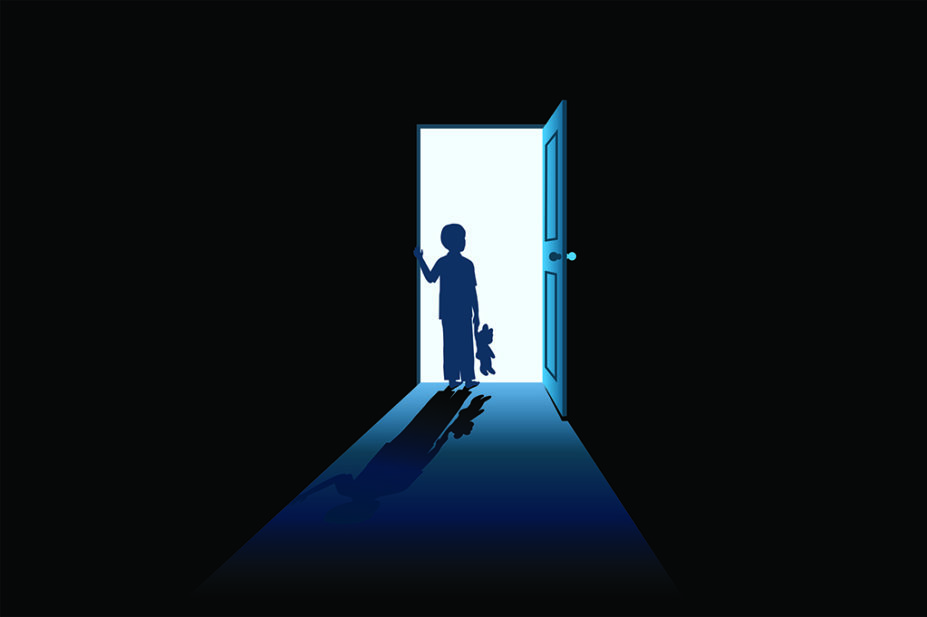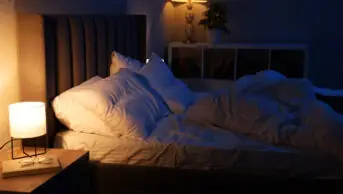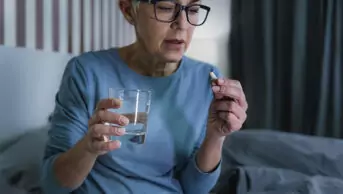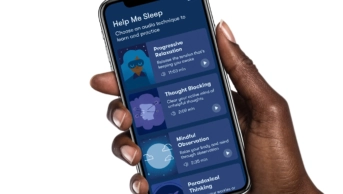
Shutterstock.com
There are four things we need in life, says Colin Espie, professor of sleep medicine at the University of Oxford: oxygen, food, water and sleep. But up to half of us will experience insomnia at some point in our lives.
Over the years, many drugs have been hailed as effective treatments for sleep problems; however, as more is understood about how they work, questions often start popping up about safety.
“If you look back over the years, you’ll see [the use of] barbiturates dropping and benzodiazepines coming up, then benzodiazepines dropping and BzRAs [benzodiazepine receptor agonists] coming up,” says Espie.
“Now, there haven’t been other new drugs in the market, so [prescribers] have gone to off-label low-dose sedative antidepressants, and even tranquilisers are being used.”
But it is not just the powerful sedatives that should be approached with caution, an increasing reliance on the chronobiotic melatonin — a seemingly innocuous hormone that occurs naturally in the body — has long been a cause of concern among sleep experts.
The body produces melatonin just after it gets dark, with levels of the hormone peaking in the early hours of the morning and reducing throughout the day; although, the amount of melatonin we produce overall declines gradually over our lifespan[1].
Unlike hypnotics, such as zolpidem, taking additional melatonin in the form of a medicine does not work by making you drowsy but by telling the body that it is approaching the time for sleep.
It’s not a blunt instrument, like a sedative, as it intervenes with the timing mechanisms of the sleep–wake cycle
Colin Espie, professor of sleep medicine at the University of Oxford
“It’s not a blunt instrument, like a sedative, as it intervenes with the timing mechanisms of the sleep-wake cycle,” says Espie. “The trouble is when to give it.”
Generally, the advice is to take melatonin one to two hours before bedtime, but Espie says, in some cases, that people may need to take it four to six hours before going to bed.
“To use melatonin most effectively, you really need to know when the midpoint of night-time sleep is … because if you give melatonin at the wrong time, you often make things worse in a circadian disorder.”
However, melatonin supplementation is unlikely to work unless you have a specific circadian rhythm sleep disorder; which are a group of disorders tied to dysfunctions or misalignments with the body’s internal clock[2].
Alastair Paterson, a specialist clinical pharmacist with a particular interest in sleep, says: “Unless somebody has a problem with their natural secretion of melatonin or the natural pathways in the brain that cause that melatonin release, it’s probably not that helpful.”
“Sleep disorders are a really broad church,” explains Paterson. “And melatonin does play a role in that, but it’s in specific areas.”
The most common circadian rhythm sleep disorder in adolescents and young adults, with a reported prevalence of 7–16%, is delayed sleep phase disorder[3]. This is when a person’s internal sleep clock is shifted by two or more hours so that they go to bed later at night and get up later in the morning; often these people are referred to as ‘night owls’.
Prescribing in young people
Under National Institute for Health and Care Excellence (NICE) guidelines, melatonin is recommended for the short-term treatment (up to 13 weeks) of insomnia in adults aged 55 years and over, or to help with jet lag in adults or insomnia in patients with learning disabilities and behaviour that challenges, where sleep hygiene measures have been insufficient[4].
In the case of insomnia in children, a short-term course of melatonin (one to two weeks initially) can be started for sleep onset insomnia and delayed sleep phase syndrome, and for insomnia in patients with learning disabilities, but only under specialist supervision[5].
Melatonin may also be offered to people who are visually impaired or blind, and for children with autism or attention deficit hyperactivity disorder (ADHD).
However, in 2017, experts raised concerns that they were seeing melatonin being handed out too readily to children who are struggling to sleep, despite little being known about the long-term risks[6].
This trend has continued. An analysis of NHS data carried out by The Pharmaceutical Journal reveals, for the first time, the extent of this prescribing in England.
The data, obtained under the Freedom of Information Act, reveal that between April 2015 and April 2022, prescribing of melatonin for patients aged 0–17 years in England almost tripled, rising from 20,881 unique patients to 56,002 (see Figure 1).
Also, the number of unique patients aged 0–17 years prescribed melatonin hit more than 60,000 for the first time in March 2022.
“The figures are a bit shocking,” says Paterson. “Although, it’s a trend I’ve noticed anecdotally in practice for a long time.
“When we think about melatonin prescribing, young people are potentially the least relevant people to have it, unless there’s another reason, because they should be secreting loads and loads of melatonin.”
Our sleep patterns, and the amount of melatonin we produce, changes considerably over the course of a lifetime. Newborn babies produce very little melatonin, which leads to varying sleep patterns, but as children grow, their sleep patterns become more consistent, eventually falling in line with daytime and night-time, with natural melatonin levels reaching their peak during the early teen years (see Figure 2).
After puberty, melatonin levels sharply decline and eventually reach a nadir at around 55 years, which is why the use of supplementation is recommended in this group.
“Teenagers can’t stop sleeping and they just want to be in bed the whole time because they go to bed late and lie in lots and don’t want to get up for school,” says Paterson.
“And that makes sense because they’ve got huge amounts of melatonin in the brain, telling the brain to sleep.
I almost think that melatonin prescribing in kids has emerged because we’re not really willing to give kids some of the more ‘hardcore’ hypnotics
Alastair Paterson, a specialist clinical pharmacist with a particular interest in sleep
“I almost think that melatonin prescribing in kids has emerged because we’re not really willing to give kids some of the more ‘hardcore’ hypnotics; because we produce melatonin naturally, it seems a little bit safer.”
Sleep disorders are on the rise
An increase in diagnosing sleep disorders and associated conditions may explain the rise in prescribing of melatonin. Nigel Gooding, a consultant pharmacist specialising in neonates and paediatrics, points to “a significant increase” in numbers of children diagnosed with autism and ADHD. “I don’t know what the figures are for the UK, but I am sure that I have seen figures from the US demonstrating this significant increase in diagnosis.”
In children and adults with neurodevelopmental disorders, the prevalence of sleep disorders is significantly higher than in the general population; as many as 80% of children with autism have difficulty falling and staying asleep, and up to half of children with ADHD experience sleep issues[7].
There are also two new licensed melatonin products now available for children: Slenyto (Flynn Pharma), which was approved for the treatment of insomnia in children and adolescents aged 2–18 years with autism in September 2018, and Adaflex (AGB Pharma), which was approved for insomnia in children and adolescents aged 6–17 years with ADHD, where sleep hygiene measures have been insufficient, in May 2020. The introduction of these may have encouraged more prescribing recently.
Although prescribing data for Adaflex is not yet available, data for Slenyto (1mg and 5mg modified-release tablets) does suggest an increase; the total number of items prescribed in 2020 was 31,811 compared to 52,132 in 2021.
The first line of intervention should always be behavioural … but, unfortunately, many families can’t access this; it’s an absolute postcode lottery
Vicki Beevers, chief executive and founder of The Sleep Charity
Vicki Beevers, chief executive and founder of The Sleep Charity, which provides advice and support with the aim of empowering the nation to sleep better, describes the rising number of patients on melatonin as “disappointing”, adding: “The first line of intervention should always be behavioural … but, unfortunately, many families can’t access this; it’s an absolute postcode lottery.”
Beevers says that sleep issues are on the rise across all age groups — not just children — with the COVID-19 pandemic playing a significant part.
“People were having more screen time, reduced exercise opportunities, a loss of routine and there was increased anxiety,” she explains.
Sleep is closely linked with mental health; people with high levels of anxiety often experience sleep problems and poor sleep can impact negatively on emotional regulation[8]. During the pandemic, levels of anxiety and depression among young people doubled[9].
“And actually, once a sleep issue becomes entrenched, something needs to occur to improve it. They don’t usually get better [on their own],” says Beevers.
Long-term use
While there is evidence that melatonin can be beneficial for tackling certain sleep issues in the short-term, it is the long-term use of the drug that most experts are concerned about.
The NHS website says that melatonin is usually used for “one to four weeks” and NICE guidance for long-term insomnia says pharmacological therapy should be avoided and approaches, such as cognitive behavioural therapy for insomnia should be offered[10,11].
Where melatonin is used, NICE says that while it appears relatively safe in the short and medium term (up to 18 months), the safety beyond that is unclear owing to there being little research on the long-term effects[12].
However, in the case of desperate families, a suggestion to stop the medication once started, without proper support in place, can be met with understandable reluctance.
“There’s parental resistance to stopping it because the parents are so worried about [their child’s sleep] going back to how it was … which I can understand because if you’re sleep deprived as a parent that you’ll do whatever to try to get your [children to] sleep,” says Beevers.
It is far too easy for children to continue on with its use once it has been tried, because it has had ‘some effect’ — that doesn’t mean it is needed long term
Steve Tomlin, director of the children’s medicines centre and associate chief pharmacist at Great Ormond Street Hospital
“What we probably don’t have the evidence for, is where melatonin is prescribed by a ‘non-specialist’ and also how often prescriptions for melatonin are reviewed with attempts at ‘treatment holidays’,” says Gooding.
Steve Tomlin, director of the children’s medicines centre and associate chief pharmacist at Great Ormond Street Hospital, agrees: “It is far too easy for children to continue on with its use once it has been tried, because it has had ‘some effect’ — that doesn’t mean it is needed long term.”
And, there is some evidence of harm in areas where melatonin is more widely available. Synthetic melatonin is only available on prescription in the UK, but in the United States, it is available over the counter as a food supplement.
A report issued by the Centers for Disease Control and Prevention (CDC) found that during 2012–2021, the annual number of paediatric ingestions of melatonin in the United States increased by 530%, with a total of 260,435 ingestions reported[13]. Alongside this, paediatric hospitalisations and more serious outcomes also increased; although, primarily because of an increase in unintentional melatonin ingestions in children aged ≤5 years.
The CDC said that there was a need for public health initiatives to raise awareness of the “potential toxic consequences of melatonin exposure” in young children, as well as more research to understand how harms may arise.
“The worry is the gap between people’s expectation and reality,” says Espie.
“People think of this is as a hormone, a naturally occurring thing, and, therefore, [it] is harmless. It can only do good.”
Some experts have questioned if melatonin, as a hormone, could affect other hormonal development in adolescents, but there is very limited research to explore this in humans[14].
“Long-term monitoring studies are often not done on things like this; we thought the benzos would be safe and effective alternatives to barbiturates, how wrong were we?,” says Espie.
Embracing routine
The majority of experts agree that in cases where melatonin is used, it should be a short-term solution, and that a more holistic approach to sleep problems is preferable.
The Sleep Charity is commissioned in some areas by the NHS to provide one-to-one sessions with families to assess a child’s sleep issues and understand possible triggers for them. “We will look into things like the circadian rhythm, the diet, any medication or illnesses that could be impacting,” explains Beevers.
“We’ll explore things like the bedroom environment and what the [sleep] routine is currently like.
“It’s only once you explore what could be causing it that you can start to put strategies in place,” she adds.
Once the source of the sleep issues has been identified, the charity will help put a programme in place to support the family to make the changes that are required.
“It’s hard work and it often gets worse before it gets better,” says Beevers. “But we’ve got the research papers out there that show, time and time again, that it’s incredibly effective and also cost-effective too.”
However, it is clear that in order to ensure equal access to this kind of support, the fundamental culture around sleep needs to change.
We don’t take sleep seriously … there is very little investment in behavioural sleep support in this country
Vicki Beevers, chief executive and founder of The Sleep Charity
“We don’t take sleep seriously,” says Beevers. “There is very little investment in behavioural sleep support in this country. What is the alternative to prescription drugs, if there aren’t qualified sleep practitioners out there who have got the capacity to be able to support families, so that they can avoid having to take melatonin?”
Espie agrees that a culture change is needed, so that people do not learn from an early age that sleep problems can just be solved by taking a pill: “We need to get sleep on the curriculum and in postnatal care and support.
“Melatonin worries me because what we’re doing nowadays is we’re not solving problems, per se. Young people are learning ‘here you go, take one of these, off you go to bed’.”
In many cases, problems with sleep can be addressed by setting up a sleep routine and sticking to it.
“Unlike almost every other drug, the situation you’re in is almost as important as the drug therapy,” says Paterson.
“If people are struggling to sleep because they’re on their phone or iPad late at night and then they are taking melatonin, it’s not going to help, because there are other things that are disturbing them.”
Conditions such as having a cool bedroom, a wind-down activity prior to bed and a light carbohydrate snack, can all contribute to a healthy sleep routine, he adds.
“There’s so many things in sleep medicine that are more important than tablets and more effective than tablets.
“I wonder, if all the devices stopped working tomorrow, would we see the same amount of melatonin prescribing?”
- 1Putting insomnia to bed. Pharmaceutical Journal. 2018. doi:10.1211/pj.2018.20205129
- 2Pacheco D. Circadian Rhythm Sleep Disorders. Sleep Foundation. 2022.https://www.sleepfoundation.org/circadian-rhythm-sleep-disorders#:~:text=People%20with%20this%20condition%20often,adolescents%20is%207%20to%2016%25 (accessed 9 Nov 2022).
- 3Circadian Rhythm Sleep Disorders . American Academy of Sleep Medicine. 2008.https://aasm.org/resources/factsheets/crsd.pdf (accessed 9 Nov 2022).
- 4Melatonin. British National Formulary . https://bnf.nice.org.uk/drugs/melatonin/ (accessed 9 Nov 2022).
- 5Melatonin. BNF for Children. https://bnfc.nice.org.uk/drugs/melatonin/#:~:text=Initially%202%E2%80%933%20mg%20daily,maximum%2010%20mg%20per%20day (accessed 9 Nov 2022).
- 6Marsh S. Too many children being prescribed melatonin to aid sleep, experts warn. The Guardian. 2017.https://www.theguardian.com/lifeandstyle/2017/may/29/melatonin-prescribed-children-fashionable-treatment-sleep-experts-warn (accessed 9 Nov 2022).
- 7Lugo J, Fadeuilhe C, Gisbert L, et al. Sleep in adults with autism spectrum disorder and attention deficit/hyperactivity disorder: A systematic review and meta-analysis. European Neuropsychopharmacology. 2020;38:1–24. doi:10.1016/j.euroneuro.2020.07.004
- 8Knowland VCP, van Rijn E, Gaskell MG, et al. UK children’s sleep and anxiety during the COVID-19 pandemic. BMC Psychol. 2022;10. doi:10.1186/s40359-022-00729-4
- 9Racine N, McArthur BA, Cooke JE, et al. Global Prevalence of Depressive and Anxiety Symptoms in Children and Adolescents During COVID-19. JAMA Pediatr. 2021;175:1142. doi:10.1001/jamapediatrics.2021.2482
- 10Melatonin -for sleep problems. NHS. 2019.https://www.nhs.uk/medicines/melatonin/ (accessed 9 Nov 2022).
- 11Insomnia: Scenario: Managing long-term insomnia (more than 3 months duration). National Institute for Health and Care Excellence. 2022.https://cks.nice.org.uk/topics/insomnia/management/managing-long-term-insomnia-greater-3-months/ (accessed 9 Nov 2022).
- 12Pacheco D. Should You Give Melatonin To Children? Sleep Foundation. 2022.https://www.sleepfoundation.org/melatonin/melatonin-for-children (accessed 9 Nov 2022).
- 13Lelak K, Vohra V, Neuman MI, et al. Pediatric Melatonin Ingestions — United States, 2012–2021. MMWR Morb. Mortal. Wkly. Rep. 2022;71:725–9. doi:10.15585/mmwr.mm7122a1
- 14Boafo A, Greenham S, Alenezi S, et al. <p>Could long-term administration of melatonin to prepubertal children affect timing of puberty? A clinician&rsquo;s perspective</p> NSS. 2019;Volume 11:1–10. doi:10.2147/nss.s181365
2 comments
You must be logged in to post a comment.



Has anyone heard of the effects UV light produced from backlit screens reducing the release of melatonin? It also happens with domestic energy-saving LED bulbs (including the daylight-mimicking ones). OK, it can be partly self-inflicted by young people but if you have ADHD then computer games are a good way to keep occupied.
Please don't underrate melatonin. Don't forget that in clinical studies the overall effect may not be overwhelming but, as I'm sure most of you will know from your knowledge of clinical studies, the so-called 'curse of the mean' means significant effects in individuals can be obscured by lack of effect in others. Cannabis for some forms of epilepsy is a classic example. Each person is an individual they may get a significant effect on sleep latency and efficiency that is way better than the mean.
Completely agree. Thanks for putting this critical piece out. I'm Ali, co-founder of Chorus Sleep - a non-pharmaceutical for insomnia. Another problem with melatonin (in addition to what you raised here) is the amounts found in over-the-counter supplements can vary DRAMATICALLY, so you don't know what you're getting. I like that you highlighted the importance of changing routine more than using supplements. We conduct a ton of research internally, and as I'm sure many people in this community know, the most impactful thing for improving sleep quality is keeping a consistent wake and bedtime schedule seven days a week.
It's also interesting to call out the rise in sleep problems since COVID. I'm not sure of the equivalent number for children, but for adults in the US - before COVID, it was estimated that 66% of adults had trouble sleeping each week, and now that number is estimated to be 86%. Clearly, the rise of stressors in our life, disruption to routine and cues our brain relies on for circadian rhythms (like working from home under fluorescent lights late into the night) is making our sleep worse, which is problematic for mental and physical health.
The combination of rising sleep challenges and insufficient solutions is becoming a more dire problem by the day. Thank you for writing about this important topic - education is a critical part of working together to solve it.
PS here is my LinkedIn if you ever want to connect directly: https://www.linkedin.com/in/ali-abramovitz-cook-69458459/